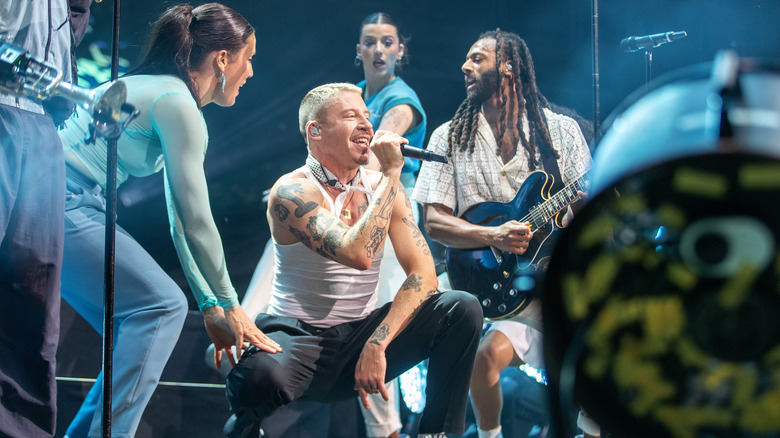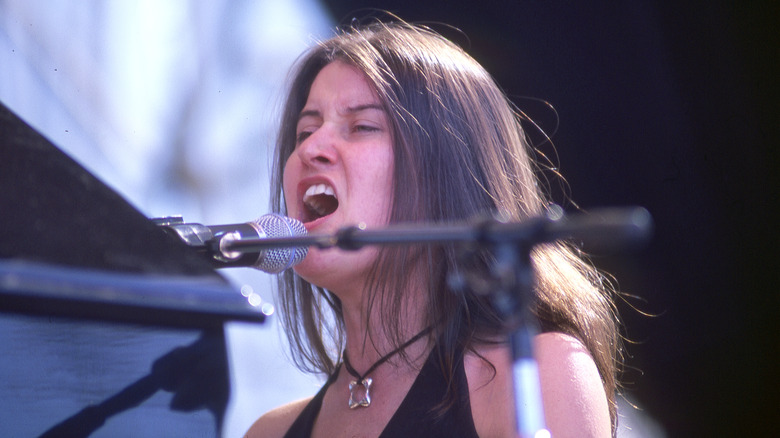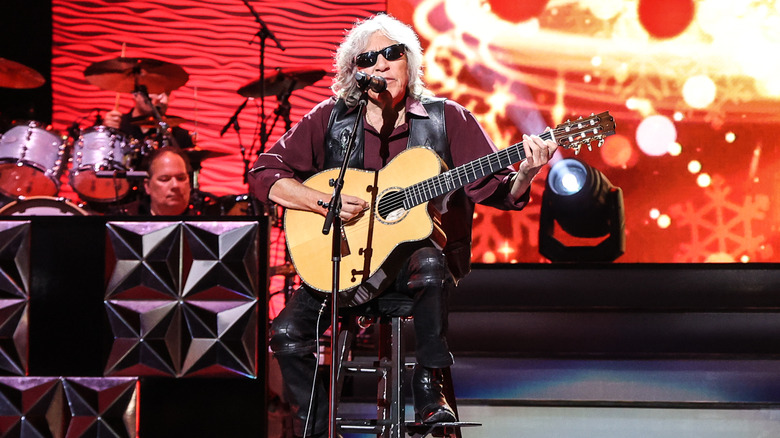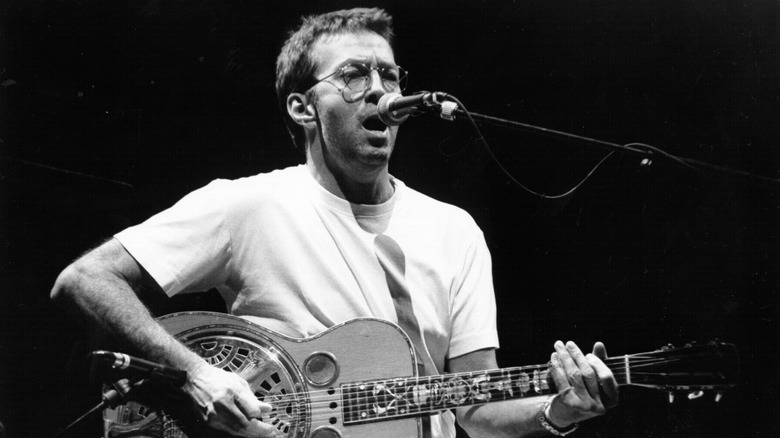Grammy Wins That Are Still Controversial To This Day
At this point, there isn't a person alive who hasn't taken issue with the Grammys — the nominations, the wins, or even the whole idea of the show to begin with. Is it just a popularity contest, or does it claim to somehow objectively evaluate the quality of this or that music? Who chooses who gets nominated, who votes, and what are the voters' qualifications? How does the show settle on categories that sometimes barely make sense, like pop vs. pop/dance vs. dance/electronic, R&B vs. traditional R&B, but no "traditional" rock or jazz, and yes "alternative" jazz? Do the Grammys in any way reflect real, contemporary musical movements, or is it just a soulless industry pageant?
All these questions are to say: There's a vast multitude of things to object to when it comes to the Grammys, even beyond the winners. The first Grammy Awards, held in 1959, included the likes of Ella Fitzgerald and Count Basie, and few people would object to such legends winning anything. But it's easy to make such statements in hindsight. Sometimes the public evaluates winners on whether or not they fit the cultural moment, and sometimes it's just, "But I like this person, boo hoo." But even so, there are times when some wins almost universally come across as tone-deaf, controversial, or just plain strange. This list touches on some — but not nearly all — of the odder Grammy wins throughout history.
Macklemore vs. Kendrick Lamar
We might as well start this list with a somewhat recent, standout entry: Macklemore and Ryan Lewis ("The Heist") vs. Kendrick Lamar ("Good Kid, M.A.A.D. City") were both nominated in 2014 for Best Rap Album at the 56th Grammys. To put things in perspective, the Grammys website recounts that this is the year that Robin Thicke released his infamous "Blurred Lines" video, Lorde popped into the music scene with "Royals," and Daft Punk won Best Album for "Random Access Memories."
Macklemore and Kendrick Lamar went head-to-head with heavyweights Kanye West, Jay-Z, and Drake for Best Rap Album, and while Kendrick Lamar has never been anything less than an absolute critical and public darling in every respect, Macklemore has often been the exact opposite, to say the least — and an easy target, to boot.
Macklemore and Ryan Lewis won for Best Rap Album that year, which left a lot of people scratching their heads — including Macklemore. To show how baffled and contrite he was, Macklemore posted on Instagram the actual text that he sent Lamar proclaiming how baffled and contrite he was. "You got robbed," he wrote, "I wanted you to win. You should have. It's weird and sucks that I robbed you." Macklemore also reiterated this sentiment in his Instagram post. Fellow competitor Drake criticized Macklemore for this move, but Lamar was very gracious, saying via Variety, "Macklemore is a genuine dude ... I wish him much success. He touched people's souls, and no one can take that away."
Metallica vs. Jethro Tull
This next entry will likely go far in explaining why many consider the Grammys so desperately out of touch. This is especially true when it comes to anything remotely approaching heavier music. Enter the 31st Grammys in 1988, the year when Metallica, AC/DC, Iggy Pop, and Jane's Addiction entered the Best Hard Rock/Metal Performance Vocal or Instrumental arena against ... Jethro Tull?? Yes, the flute guys. And Jethro Tull won for "Crest of a Knave" — an acoustic, synth-heavy, sometimes dance-y album — against the likes of Metallica's metal classic, "... And Justice for All." While it would be easy to make the gag that Jethro Tull was the only name that the Grammys voters recognized ... Okay, we just made the gag.
Much like other entries in this list, everyone on the night in question knew the choice was bizarre. Punk legend Alice Cooper and guitarist Lita Ford gave away the award, and as we can see on YouTube, they were a bit like, "Huh, weird." Loudersound says that the audience started laughing. Loudwire reported that Ian Anderson — the flute guy — recounted being "perplexed and amused" when Tull was announced in the category. Guitarist Martin Barre, on recommendation from his label, didn't go to the awards at all because their win seemed so unlikely.
To be fair, that year was the first year for the Grammy's "hard rock/metal" category, to show that they were real hip cats with the youths. Sadly, they failed miserably.
Paula Cole vs. Everyone
For those who were alive in 1998, "Paula Cole" is the "I Don't Wanna Wait" singer — also, that song opens "Dawson's Creek." And while the Grammy's can't be blamed in retrospect for not having accurately predicted the career trajectories of winning artists — the awards are based on the year after all — it does seem odd that Paula Cole would win the Best New Artist category over the likes of Erykah Badu, Puff Daddy, and Fionna Apple. This is true no matter how good Cole or her song were.
Judging by the Grammys website, there was a surge of interest in folksy singers at the time, including Sarah MacLaughlin, Jewel, and Shaun Colvin. There were also a lot of dreamy, floaty tracks like R. Kelly's "I Believe I Can Fly," and Seal's cover of Steve Miller's "Fly Like an Eagle." Maybe the Grammys were hoping that Cole would lead a new wave of homegrown, Americana ballads moving into the 21st century.
On Stereogum, Paula Cole describes not only the backlash she received from her win but how it led her towards a "smaller, humbler, a more authentic career." She described the night of her win as "confused and amazing," and felt that she wasn't a good fit as an "introvert" and "dark horse" candidate. Ultimately, Cole believes that the win set her on the right life track, saying, "That trajectory that I was on needed to be stopped. This is who I'm meant to be now."
Feliz Navidad!
In what is much more of a quirky entry on our list rather than anything controversial: Feliz Navidad! That is, "Feliz Navidad" the song that taught people at least two Spanish words. While the Grammys might be the last thing the reader imagines when thinking of this extremely charming, heartfelt, and singable Christmas song, the song's writer, Jose Feliciano," won the Grammy for Best New Artist way back in 1968, per the Grammys. Just to give you an idea of the time, this is the year when The Beatles' "Hey, Jude," Simon & Garfunkle's "Mrs. Robinson," and Otis Redding's "(Sittin' On) The Dock of the Bay" came out. In fact, it's the era that might make Jose Feliciano more of an odd Grammy winner than anything else.
Feliciano was nominated for three other Grammys in addition to Best New Artist, and also won Best Contemporary-Pop Vocal Performance, Male for "Light My Fire." Two years later in 1970, he wrote "Feliz Navidad." Feliciano told Billboard of his 19-word, bilingual song, "If I had left in Spanish only, then I knew the English stations might not play it, so I decided to write an English lyric." He also cites the song's simplicity as underpinning its success. And while people may remember this song and don't know who Feliciano is — or that he won the Grammy for Best New Artist over 55 years ago — we all sing his song every year.
Eric Clapton vs. Nirvana
We've only scratched the surface with this list. There are a lot — we repeat, a lot — more examples of Grammy upsets that we could have chosen. But for now, let's end on a Grammy win that, while easy to evaluate objectively, presents a conundrum for anyone with a drop of human empathy inside them. Namely, we're talking about Eric Clapton and his 1992 "MTV Unplugged" performance.
That year at Unplugged, Clapton included "Tears in Heaven" in his set, a song that's doubtlessly made thousands upon thousands — if not millions — cry. Clapton wrote the song in honor of his deceased 4-year-old son. He also included acoustic renditions of hits like "Layla" in his set, a song that in its original, 1970, rock 'n' roll form, features its instantly recognizable, seven-note riff. But, it's the 1992, chill acoustic version that won Best Rock Song against the likes of Nirvana's "Smells Like Teen Spirit" and Pearl Jam's "Jeremy."
Clapton swept the Grammys that year, including winning Best Album for his Unplugged album, and Record of the Year for "Tears in Heaven." And while no one would doubt Clapton's worthiness as a musician, some suspected that the poignancy of "Tears of Heaven" swayed the Grammy judges too much. After all, an acoustic, 22-year-old cover (of himself) won out against era-defining grunge tracks. As Variety says, this move went far in convincing people that the Grammys were indeed long out of touch.





